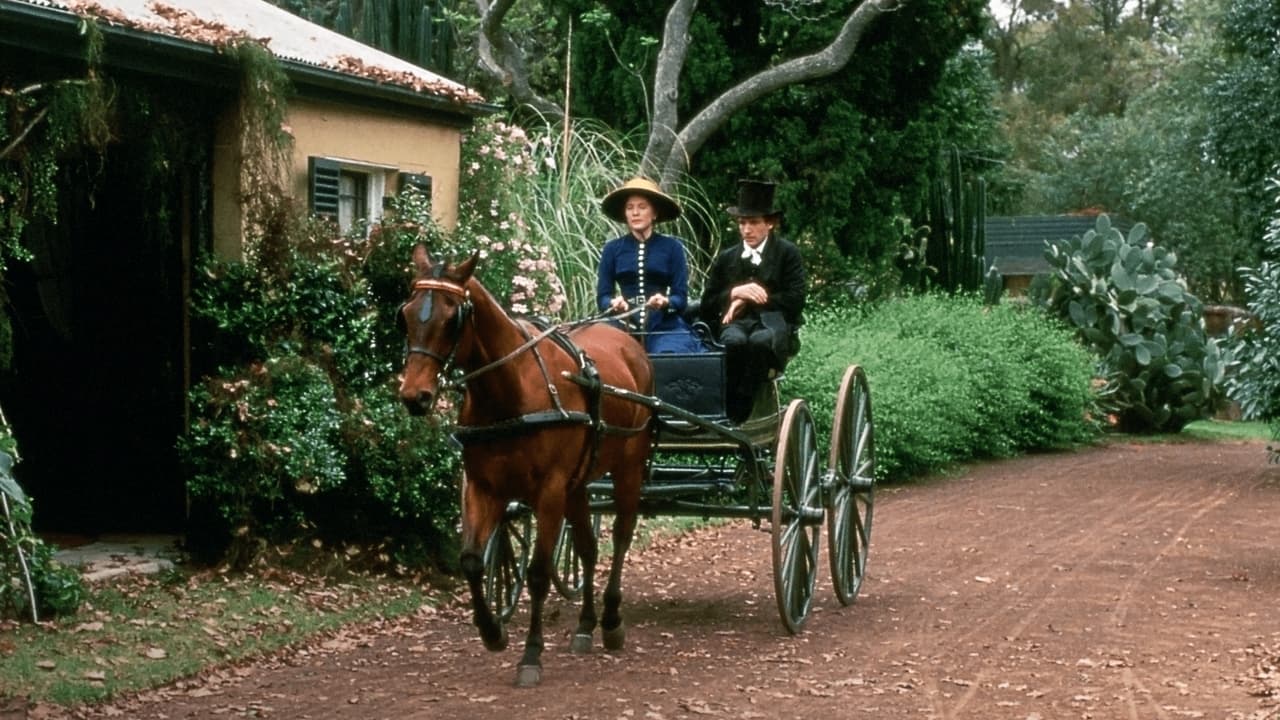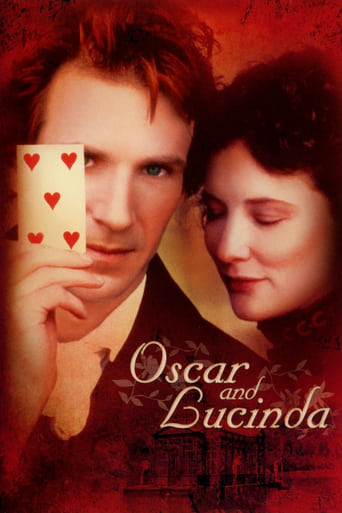

Yawn. Poorly Filmed Snooze Fest.
... View MoreStylish but barely mediocre overall
... View Moreit is the rare 'crazy' movie that actually has something to say.
... View MoreIn other words,this film is a surreal ride.
... View MoreHere's a movie which appears to have a lot going for it: adaptation of a Booker Prize novel, directed by Gillian Armstrong, Ralph Fiennes straight from his triumph in the English Patient, and Cate Blanchett in her first significant role. I haven't read the novel -- and after seeing the movie I certainly won't. This is a strange story (whose plot I won't repeat for anyone wishing to be surprised) with characters that are completely unconvincing, despite the best efforts of Fiennes and Blanchett, in a story that might serve the fantastical imagination of certain directors. Gillian Armstrong is not one of those. Instead we are given a semi-realistic exposition of a tale that never inspires the suspension-of-disbelief necessary to put it across. Pay no attention to the names on the marquee. This is not a good movie, merely an odd one.
... View MoreI believe this movie was quite splendid indeed.I especially enjoyed the part where Oscar said "The" It really was quite smashing.Coming from England I believe this movie was very accurate.My mates and I had a wonderful time watching this film; We believed it was "Sexcii" as the "hip" kids call it these days.Well I must be going now.Chereo! Toodaloo! Right Oh! Goodbye Chaps! Good Evening And Etc.p.s. It was exciting.p.p.s. It was also romanticp.p.p.s It also was a tab bit sadp.p.p.p.s It had a nice plot i say!
... View MoreFirst things first, Cate Blanchett and Ralph Fiennes are water and air for the world's film industry as we know it. Very few actors working today can stand side by side with them when it comes down to the Nitty-Gritty of acting chutzpa! So when reviewing a film in which they both starred, with a fine director, fine script and cinematography, it's very hard not to want to get that out of the way first. It's also very hard trying to put into words how well they did justice to this film. It was breathtaking (especially the floating church scene), it was heartbreaking, it was bittersweet, it was beautiful, it was thought provoking, it was marvelous, it was well narrated, it was well acted, it was well directed, it was picturesque!Oscar and Lucinda (Fiennes and Blanchett) are two young adults who love to gamble. Oscar's a priest and Lucinda's socialite just coming out in society. One evening, they meet aboard a gigantic ship (almost like Jack and Rose in Titanic) and the instant chemistry between is ignited. But they quickly have a falling out when Oscar's fear of the Ocean causes him to offend Lucinda. By the way, let me point out that both of them had scarred childhoods, Oscar's mother died while he was very young and the impact virtually drove his father insane, while Lucinda endured parents who were unhappy with one another but pretended to be happy for the sake of their daughter. When her father died, her mother slowly became a living corpse until she eventually died years later, leaving Lucinda devastated but well taken care of financially.One day, Oscar and Lucinda make amends to their friendship and slowly become closer and closer. Lucinda then decides to build a glass church for their mutual friend, a priest who lives miles away and Oscar bets he can deliver it to him before Good Friday. By doing this, they both break their promise never to gamble again and this sets up a dramatic chain of sorrowful events that occur in the wake of Oscar's journey. A character that Fiennes plays to the pulp!
... View More*Oscar and Lucinda* is based on a brilliant, though very tough-to-adapt, novel by Peter Carey. It is a small miracle that director Gillian Armstrong succeeded so magnificently. (I'm giving all the credit to her: the end-credits tell us that the script was developed by the "Australian Film Commission" or something, whatever that is. I doubt that they were actually on the set.) For all you young filmmakers out there dreaming of making a Big Epic with Big Themes, I urge you to watch this movie right now, and learn how to construct a narrative out of the most rambling source material. The two titular characters -- one starting out in England, the other in Sydney, Australia -- don't even meet until about 40 minutes into the film; it's all the more impressive that we don't feel impatient for this meeting, realizing that their connection will occur as a result of the natural and logical development of the story. Aside from Oscar and Lucinda, Armstrong also has to manage about 8 or 9 other characters who will be crucial to the plot. Each character is introduced just when they need to be: the process is never hurried or confusing. As all the elements of narrative and character come together, we realize Armstrong has created nothing less than an art of cinematic fugue tantamount to genius.Budding filmmakers may also want to take notes on Armstrong's judicious use of voice-over narration in the film. The Narrator pipes up only when he needs to, providing crucial information or the occasional bit of witty commentary. ("In order that I exist, two gamblers -- one obsessive, the other compulsive -- must declare themselves.") It's also marvelous how the Narrator himself, seemingly so omniscient, becomes the very culmination of the story. In other words, the Narrator is a key element, rather than a superfluous chatterbox -- the case of most movie narrators.The story is set in the 1850's, revolving around a saintly young Anglican minister (Ralph Fiennes) who, trying to escape his gambling addiction, takes a ship to Australia. On board, he meets Lucinda (Cate Blanchett), an ahead-of-her-time independent businesswoman from Sydney who is returning home after a buying expedition for her glass-works factory. She is also nursing a gambling problem. Naturally, the two misfits form an immediate bond. Upon arriving in Sydney, Oscar promptly wrecks his ministry before it even gets started when he's caught playing cards with his new friend. Adding to his woes, he believes that Lucinda is in love with ANOTHER minister (Ciaran Hinds) who has already been run out of town -- banished to the church-less frontier -- because of his friendship with her. (Beautiful and single and a gambler, Lucinda is a sort of eye of a hurricane -- only her wealth keeps her from getting tarred and feathered, apparently.) The naif Oscar, despite all indications that his affection for her is reciprocated, hits upon a new wager: he bets Lucinda that he can deliver a glass church to Hinds via a dangerous overland journey across the continent. The stakes? Each other's inheritance . . . and, for Oscar, ultimate proof that he loves Lucinda more than any man.This is a wonderful story, chock-full of some pretty startling ideas -- for instance, that religious faith itself is little more than a cosmic gamble -- and immersed in the visual symbols of water (i.e., Death) and glass (declared here as a solid form of liquid). The two symbolic motifs converge near movie's end, when Fiennes sits alone in the glass church as it floats down a river -- truly a magnificent sight to see that would justify a dozen lesser movies than this one. One review below mine judged this as "overdone": but it seems to me that if you aren't impressed with this image, then you just don't like the movies, sorry. I also differ with the general opinion that the climax of the film is intolerably depressing. It seems to me that God saves the saintly Oscar from an unhappy life shared with someone he could never love. True saints can never be with us for very long: they set examples for us, but they're soon called home to God. In any case, the movie's symbolism was telling you all along what Fiennes' fate would be.Sorry for the long review, but this is a great film. Let me conclude by saying that Fiennes has never been better than here, perhaps because he's not handsomely and sulkily brooding, for once: Oscar is a true oddball, and Fiennes handles him delicately. Excellent work. And this movie also introduced us to the great Cate Blanchett, who has more than lived up to the promise that she manifested here.9 stars out of 10.
... View More